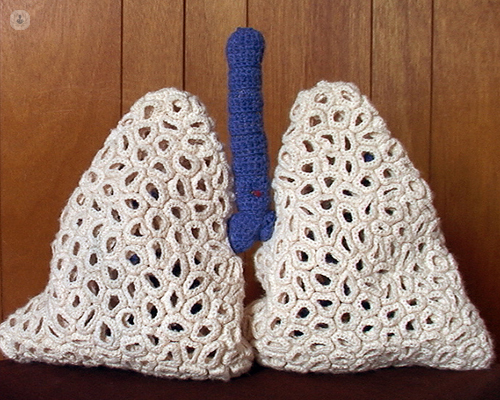Pulmonary fibrosis – the symptoms to look out for, and when to get treatment
Written by:Pulmonary fibrosis is a term that describes a build-up of scar tissue within the lungs. It is also known as interstitial lung disease. There are many different forms of pulmonary fibrosis with a number of causes. Respiratory specialists with an interest in fibrosis will investigate to try to identify the type of fibrosis and what may have led to it.

What are the symptoms of pulmonary fibrosis?
The symptoms of pulmonary fibrosis usually gradually get worse over time, with the following symptoms usually experienced:
- Shortness of breath
- Difficulty breathing
- Persistent cough
- Feeling tired
- Weight loss
- Loss of appetite
- Clubbed fingers (a change in the shape of nails)
It is important to see a specialist if you are experiencing these symptoms, especially if you’ve had them for a while.
What causes pulmonary fibrosis?
One of the commonest forms of pulmonary fibrosis is idiopathic pulmonary fibrosis (IPF). This condition does not have a known cause but does lead to significant symptoms in patients as often do all types of fibrosis.
Some causes of pulmonary fibrosis are known:
- Exposure to allergens such as bird feathers for long periods.
- Patients with rheumatological diseases such as rheumatoid arthritis and scleroderma.
- Certain drugs can cause pulmonary fibrosis as a side-effect.
How is pulmonary fibrosis treated?
Each form of fibrosis has different treatment options. New agents that are described as being anti-fibrotics have been used in recent years for patients with idiopathic pulmonary fibrosis. Although they do not cure the condition, they can slow the rate of progression. Patients with other types of fibrosis may benefit from medications to suppress the immune system. Steroid medication is often used with other immunosuppressant drugs added in.
One of the most successful therapeutic interventions is pulmonary rehabilitation, which is a tailored exercise programme aimed at improving fitness, increasing muscle strength and helping the patient cope with feeling breathless.
If you are concerned about breathlessness, or any of the other symptoms mentioned. Make an appointment with a specialist here.


